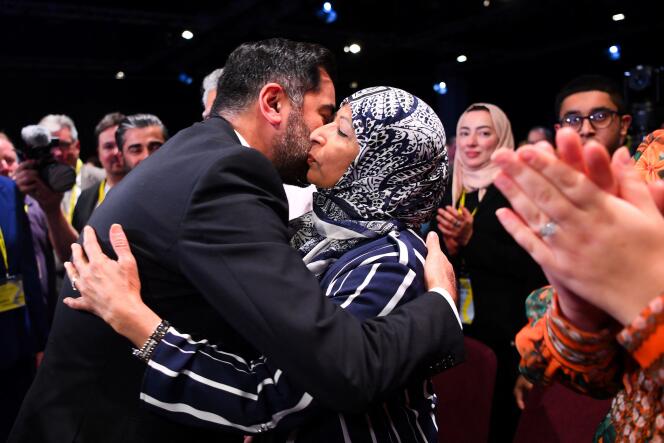


Scotland's First Minister Humza Yousaf was the first Western leader to call for a ceasefire between Israel and Hamas and the establishment of humanitarian corridors for Gaza. As early as October 10, three days after the massacre committed by the terrorist organization in southern Israel, he asked the British government to relay his message. In an interview with Al Jazeera, he said that he "completely understands" why Israel wants to "protect itself from terror" but that "the collective punishment of men, women and children simply cannot be justified. The overwhelming majority have nothing to do with Hamas." In recent days, he has also called for the UK to take in Palestinian refugees and proposed that Scotland should be the first to volunteer.
In so doing, he was expressing the position taken by his party, the Scottish National Party (SNP), in favor of Scottish independence and self-determination movements. But for this 38-year-old leader of Pakistani origin and Muslim faith, family tragedy and geopolitics go hand in hand, making him even more sensitive to the situation in the Middle East. His wife, Nadia El-Nakla, an SNP councilor in Dundee (northeast Scotland), is of Palestinian origin, and her parents, Maged and Elizabeth El-Nakla, like her brother and extended family, are trapped in the Gaza Strip in terrible conditions.
In recent days, Yousaf has not hesitated to share details of their ordeal while continuing to hone his strategy for Scottish independence, announcing tax freezes or congratulating the Scottish football team on qualifying for Euro 2024. On October 13, he shared a video of his mother-in-law, a retired nurse, who, with a broken voice, bids farewell to her family: "This will be my last video. We went to the south [of the Gaza Strip, as requested by Israel]. But these people who no longer have water and food, all those in hospital who can't be evacuated: where's humanity?"
Two days later, he retweeted his wife's speech at the SNP's annual conference in Aberdeen. "Give the children of Gaza a chance at life. Let my niece Leila, my nephews Majid and Amjad and my newest nephew, Amir, only 8 weeks old, let them survive," Nadia El-Nakla implored. O October 19, between two warnings of the arrival of Storm Babet over the east of the country, he explained again on social network X (formerly Twitter) that his brother-in-law, "a doctor in Gaza, is spending his seventh consecutive day in hospital. Health workers in Gaza are heroes."
This politician, born and raised in Glasgow in a trading family from the Punjab region, is proud of his dual Pakistani and Scottish culture. In 2011, having just been elected a Member of Parliament, he caused a sensation at the Edinburgh Parliament by taking the oath of office first in English and then in Urdu. Weighed down by his wife's personal tragedy, he has so far managed to walk a fine line, calling for humanity for the Palestinians without minimizing the atrocities committed by Hamas or the trauma experienced by Israelis. This stance has made him a great success in the eyes of the Scottish media, who had previously regarded him as an unremarkable successor to the charismatic Nicola Sturgeon.
